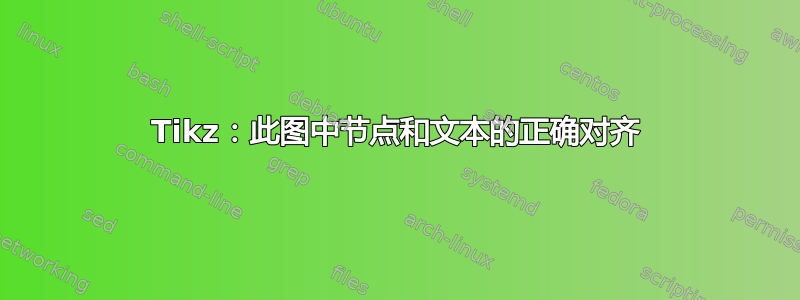
我想完善下图。我想将此图左侧显示的文本左对齐,并且需要直线路径。任何帮助都将不胜感激。谢谢

\documentclass[tikz]{standalone}
\usepackage{pgf}
\usepackage{tikz}
\usetikzlibrary{arrows, automata, calc}
\usepackage[latin1]{inputenc}
\begin{document}
\begin{tikzpicture}[
->
, >=stealth'
, shorten >=1pt
, auto
, node distance=1.0cm
, semithick
]
\tikzstyle{every state}=[
fill=white
, draw=none
, align=left
%, text width=9cm
, text=black
]
\node[state] (TotalNi) {Total Ni};
\node[state] (AN) [below of=TotalNi] {AN};
\node[state] (CC) [below of=AN] {CC};
\node[state] (SC) [below of=CC] {SC};
\node[state] (EDTA) [below of=SC] {EDTA};
\node[state] (ABDTPA) [below of=EDTA] {ABDTPA};
\node[state] (DTPA) [below of=ABDTPA] {DTPA};
\node at (5,-6.0) [draw,name=u1,rectangle, minimum width=2cm,minimum height=5.75cm,anchor=south,transform shape] {Test};
\path[sloped, above, pos=0.4, yshift=0.1cm, anchor=south, auto=false]
(TotalNi) edge node {\textcolor{red}{$-0.06557$}} (u1.north west) ;
\path[sloped, above, pos=0.4, yshift=0.1cm, anchor=south, auto=false]
(AN) edge node {\textcolor{blue}{$0.04305$}} (u1) ;
\path[sloped, above, pos=0.4, yshift=0.1cm, anchor=south, auto=false]
(CC) edge node {\textcolor{red}{$-0.34954$}} (u1) ;
\path[sloped, above, pos=0.4, yshift=0.1cm, anchor=south, auto=false]
(SC) edge node {\textcolor{red}{$-0.34954$}} (u1) ;
\path[sloped, above, pos=0.4, yshift=0.1cm, anchor=south, auto=false]
(EDTA) edge node {\textcolor{red}{$-0.34954$}} (u1) ;
\path[sloped, above, pos=0.4, yshift=0.1cm, anchor=south, auto=false]
(ABDTPA) edge node {\textcolor{red}{$-0.34954$}} (u1) ;
\path[sloped, above, pos=0.4, yshift=0.1cm, anchor=south, auto=false]
(DTPA) edge node {\textcolor{red}{$-0.34954$}} (u1.south west) ;
\end{tikzpicture}
\end{document}
答案1
\documentclass[tikz,margin=5]{standalone}
\usepackage{pgf}
\usepackage{tikz}
\usetikzlibrary{arrows, automata, calc,fit}
\usepackage[latin1]{inputenc}
\begin{document}
\begin{tikzpicture}[
->
, >=stealth'
, shorten >=1pt
, auto
, node distance=1.0cm
, semithick
]
\tikzset{every state/.style ={
% fill=white
, draw=none
, anchor = west
, rectangle
, minimum width= 1.5cm
, text width = 1.4cm
, text=black
}
}
\node[state] (TotalNi) {Total Ni};
\node[state] (AN) [below of=TotalNi] {AN};
\node[state] (CC) [below of=AN] {CC};
\node[state] (SC) [below of=CC] {SC};
\node[state] (EDTA) [below of=SC] {EDTA};
\node[state] (ABDTPA) [below of=EDTA] {ABDTPA};
\node[state] (DTPA) [below of=ABDTPA] {DTPA};
\node[draw,rectangle,xshift=5cm] [fit = (TotalNi) (AN)(CC) (SC) (EDTA) (ABDTPA) (ABDTPA) (DTPA)] (u1) {Test};
\path[sloped, above, pos=0.4, yshift=0.1cm, anchor=south, auto=false]
(TotalNi.east) edge node {\textcolor{red}{$-0.06557$}} ($(u1.north west)!(TotalNi.east)!(u1.south west)$) ;
\path[sloped, above, pos=0.4, yshift=0.1cm, anchor=south, auto=false]
(AN) edge node {\textcolor{blue}{$0.04305$}} ($(u1.north west)!(AN.east)!(u1.south west)$) ;
\path[sloped, above, pos=0.4, yshift=0.1cm, anchor=south, auto=false]
(CC) edge node {\textcolor{red}{$-0.34954$}} ($(u1.north west)!(CC)!(u1.south west)$) ;
\path[sloped, above, pos=0.4, yshift=0.1cm, anchor=south, auto=false]
(SC) edge node {\textcolor{red}{$-0.34954$}} ($(u1.north west)!(SC)!(u1.south west)$) ;
\path[sloped, above, pos=0.4, yshift=0.1cm, anchor=south, auto=false]
(EDTA) edge node {\textcolor{red}{$-0.34954$}} ($(u1.north west)!(EDTA)!(u1.south west)$) ;
\path[sloped, above, pos=0.4, yshift=0.1cm, anchor=south, auto=false]
(ABDTPA) edge node {\textcolor{red}{$-0.34954$}} ($(u1.north west)!(ABDTPA.east)!(u1.south west)$) ;
\path[sloped, above, pos=0.4, yshift=0.1cm, anchor=south, auto=false]
(DTPA) edge node {\textcolor{red}{$-0.34954$}} ($(u1.north west)!(DTPA.east)!(u1.south west)$) ;
\end{tikzpicture}
\end{document}

这是另一个版本。
\documentclass[tikz,margin=5]{standalone}
\usepackage{tikz}
\usetikzlibrary{arrows,calc,fit}
\tikzset{
->
, >=stealth'
, shorten >=1pt,
my node/.style = {align=left,anchor=west},
your node/.style={above,pos=1,xshift=-2cm,text = red}
}
\begin{document}
\begin{tikzpicture}
\node[my node] (TotalNi) at (0,0) {Total Ni};
\node[my node] (AN) at (0,-1) {AN};
\node[my node] (CC) at (0,-2) {CC};
\node[my node] (SC) at (0,-3) {SC};
\node[my node] (EDTA) at (0,-4) {EDTA};
\node[my node] (ABDTPA) at (0,-5) {ABDTPA};
\node[my node] (DTPA) at (0,-6) {DTPA};
\node[draw,rectangle,xshift=5cm] [fit = (TotalNi) (AN)(CC) (SC) (EDTA) (ABDTPA) (ABDTPA) (DTPA)] (u1) {\rotatebox{90}{Test}};
\draw[->](TotalNi.east) -- node[your node] {$-0.06557$} ($(u1.north west)!(TotalNi.east)!(u1.south west)$) ;
\draw[->] (AN) -- node[your node,text = blue] {$\phantom{-}0.04305$} ($(u1.north west)!(AN.east)!(u1.south west)$) ;
\draw[->] (CC) -- node[your node] {$-0.34954$} ($(u1.north west)!(CC)!(u1.south west)$) ;
\draw[->] (SC) -- node[your node] {$-0.34954$} ($(u1.north west)!(SC)!(u1.south west)$) ;
\draw[->] (EDTA) -- node[your node] {$-0.34954$} ($(u1.north west)!(EDTA)!(u1.south west)$) ;
\draw[->] (ABDTPA) -- node[your node] {$-0.34954$} ($(u1.north west)!(ABDTPA.east)!(u1.south west)$) ;
\draw[->] (DTPA) -- node[your node] {$-0.34954$} ($(u1.north west)!(DTPA.east)!(u1.south west)$) ;
\end{tikzpicture}
\end{document}

答案2
我认为,通过在最后一部分使用 foreach 循环,可以减少(并且在我看来是改进)图形的代码。此外,语法(a-|b)还可用于指定每条线结束的坐标,即包含a标签的节点和b大框的“西”侧。
另外,由于我注意到数字的颜色是基于其符号的,所以这也可以实现自动化。
使用这些想法,代码可以简化为:
% All the code up to the line
% \node[draw,rectangle,xshift=5cm] [fit = (TotalNi) (AN)(CC) (SC) (EDTA) (ABDTPA) (ABDTPA) (DTPA)] (u1) {Test};
% remains identical
% This loop draws all the lines and numbers
\foreach \label/\amount in {
TotalNi/-0.06557,
AN/0.04305,
CC/-0.34954,
SC/-0.34954,
EDTA/-0.34954,
ABDTPA/-0.34954,
DTPA/-0.34954} {
\pgfmathparse{ifthenelse(\amount<0,"red","blue")}
\path[above, pos=0.4, yshift=0.1cm, anchor=south, auto=false]
(\label) edge node {\textcolor{\pgfmathresult}{$\amount$}}
(\label-|u1.west);
}
结果:



